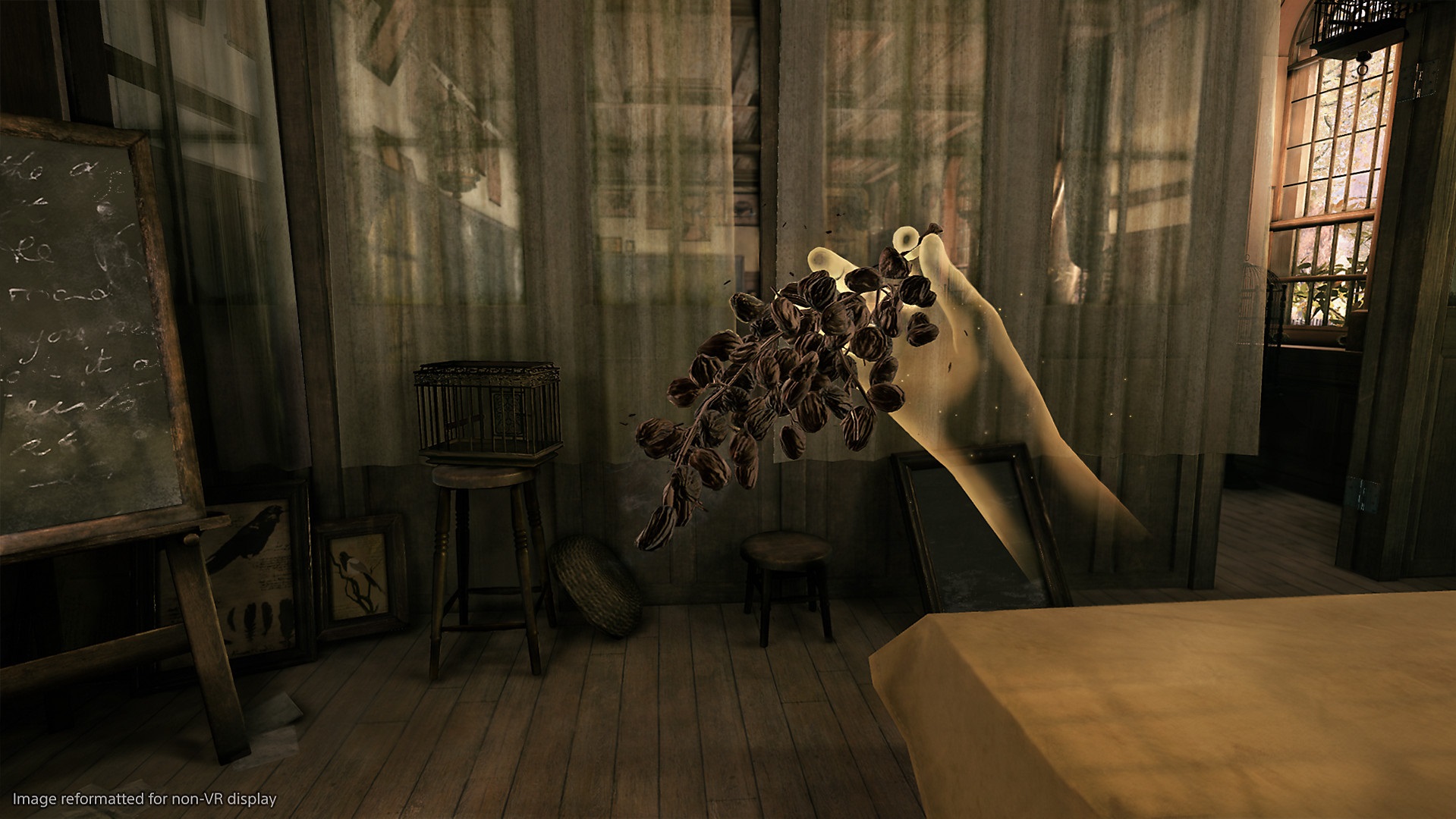Long before it became ‘the maker of Dark Souls’, From Software created, among various other RPGs and action games, adventures title like Echo Night. A far cry from the mechanical masochism of the series it’s now famous for, these story-driven experiments stood out from the pack with dark fantasy tales that took the somber tone of a Souls game in an entirely different direction.
Deracine is very much a return to those roots, and it’s an utterly fascinating one.
Your first impressions of From’s VR debut (directed by Souls creator Hidetaka Miyazaki) are likely to be conflicted. You play as a mystical faerie that stalks the halls of a painfully traditional boarding school, interacting with its cast of impossibly polite children. Scenes are frozen in time, allowing you to play games with the kids, swiping items from their pockets, over-seasoning their meals with an especially bitter herb and causing all sorts of other mischief. It’s all so very quaint; the kids talk in excited whispers and live wholesome lives, napping in trees, sharing out chores and planning a classical music recital to welcome their invisible new friend. There’s not a bad bone in their bodies.
This is From Software by way of Enid Blyton. Puzzles are refreshingly light and encourage exploration of the meticulously-detailed boarding school, but it’s the interactions between the children that you’re really here for. From has done a great job giving each of the six kids their own identity; the snoozy Herman likes to steal a nap when no one’s looking and prides himself on the fedora he’s never seen without, whilst the rotund Lornic is clumsy, gentle but also something of a leader among the pack. Though they’re all so grotesquely whimsical, you can’t help but start to like them.
Conversely, other elements of the game are Souls to the core. Deracine’s melancholic soundtrack makes exploring the boarding school comparable to a visit to Dark Souls’ Firelink Shrine, as if From had built it on top of the sacred ground. It’s got a rich sense of authenticity to it, from the brass pot-littered shelves of the kitchen to the airy confines of the built-in chapel, but it’s also so curiously eerie, especially when you step outside to marvel at a river suspended between seconds. Character models, meanwhile, are misty-eyed and uniform, giving each a somewhat mystic aura. It’s an odd mix, and one that initially makes the game hard to pin down; during the first hour I couldn’t get the slightest sense of where it was going, nor what From was hoping to achieve with its slideshow of practical jokes and archaic dialogue.
But, if the thought of these pleasantries repels you, don’t let it; Deracine hides a darker, more memorable side.
As you begin to explore the deeper effects of your misadventures, which also include the odd bit of time traveling by literally sucking the ‘time’ out of other beings, Deracine heads in directions that no other VR game has yet charted. This is a game that wants you to feel for its characters as if they were living, breathing flesh and blood, right in front of you. It’s a little too creaky to pull this off all the time, but there are a handful of moments of incredibly concentrated connection between you and the students. At these points the game establishes a bond between player and NPC just as strong as those seen in titles like Lone Echo.
It’s in the eyes, I reckon. At times you can glimpse the pure desperation in them as they glare piercingly back at you. They call out to you in ways that words can’t, injecting you with an immediate sense of very human concern. Such instances are fleeting, but they’re quite remarkable, and a powerful expression of what VR can one day be.
There are limits to this, of course; you’re never given true agency in your interactions, but Deracine does have a wonderful way of letting you come to conclusions by yourself. Puzzles can occasionally bring you to a halt but, for the most part, the solutions are hinted and prodded at in natural ways, like overhearing two students talking about what you need to do next, or applying techniques you’ve already used to new problems. The dots don’t always connect quite like they should (one particular nose-tickling scene comes closer to attempted murder than it does a harmless joke), but for the most part it straddles that oh-so-fine line between too taxing and too easy better than a lot of VR puzzle games that have come before it.
All of this amounts to a story that, for once, feels comfortably told in its short running time. I played it through in one three-hour sitting which, early confusion aside, was well-paced with plenty of twists and, astonishingly, an ending that doesn’t feel abrupt. If it’s longer-form content you’re after then you’ll want to look elsewhere (as will those that don’t agree with the node-based locomotion), but Deracine builds a great case for making feature-length narratives the future of VR.
Deracine’s initially dulcet tone certainly won’t be for everyone but scratch below the surface and you’ll discover a VR adventure that heads in some fascinating new directions. It’s a bizarre beast, placing the ambiguity From Software is known for in the front and center but, despite its often ham-fisted dialogue, it finds genuinely powerful moments of connection as it weaves a memorable yarn. Deracine might not be the game that truly breaks down the barriers between the player and the virtual characters and worlds they love, but it’s definitely a strong sign that VR is heading that way.
Deracine launches on PlayStation VR on November 6th for $29.99. Read our Game Review Guidelines for more information on how we arrived at this score.



























